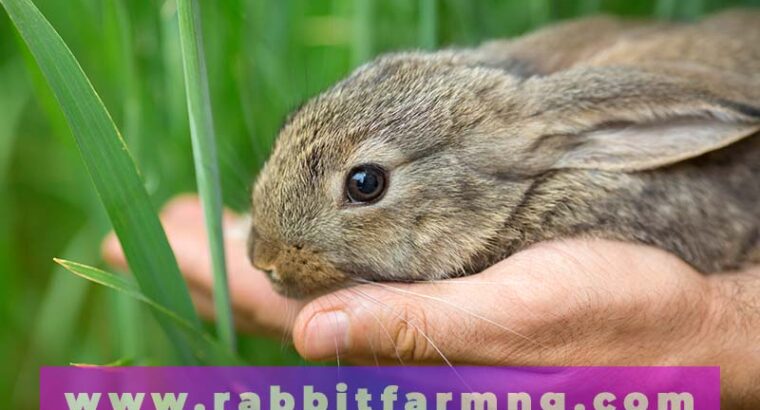8 Common Rabbit Diseases And How to Treat Them
Rabbits are popularly known for their calm and friendly state, also profitable for fur and meat production. For this purpose, we can’t do without them, as they are highly important service both health and material benefits.
They also are a very good healthy meat option (White Meat) in Nigeria, and a very good source of protein.
For this purpose, it’s very important as a Rabbit farmer to pay adequate attention to your rabbits, knowing when there is a change in their behavior and attitude.
In order to get us informed on the basic things to notice, I will be making some list on popular and common diseases rabbits can get, and possible ways to get them cured.
Read also: 5 ways to care for your rabbit in hot weather
 Learn More
Learn More1. Ear Mites Infestation
Ear mites are little bugs that associates their self with the rabbit’s ear, making the ear look really crusty, brown and itchy looking dry and dusty.
If you see your rabbits scratching their ears a lot, then you need to check them. You might have to check your rabbit’s ears almost daily to be sure they are clean of mites.
But if your rabbits get ear mites, don’t feel bad.
If you notice your rabbits ears are full of mites, then it is time to get to work.
You’ll need a dropper to drop oil in the affected parts( A Bottle can be used)
Then fill it with oil of any kind. You can use vegetable oil because it is inexpensive, and then place a few drops of oil in the infected ear twice – thrice a day for 7 days. This smoothens the ear, and relieves the crusty skin from the ear.
However, it is important NOT to pick the scabs out of your rabbit’s ears. They will clear up naturally. Picking at it will be painful for your rabbit and also open them up to more possibility of infection. Just let the oil do the work.
2. Snuffles Rabbit Disease
When you see that your rabbits have nasal discharge or are sniffling then you need to pay attention to what is happening.
Other symptoms of the snuffles are matted paws, sneezing, and watery eyes.
Basically, this disease is best prevented by keeping your rabbits on a healthy diet and also keeping your rabbitry clean. The snuffles is a type of bacteria so if you keep their immune system ready to fight while also not giving bacteria a place to grow, then you should stay ahead of this disease.
However, if by some chance your rabbits develop this disease, then it is usually best to try and treat them with antibiotics, though they are not guaranteed to treat this illness.
3. Heat Stroke
This is a popular disease which affects rabbits.
Heat stroke is something you have to really pay attention to when it comes to keeping rabbits. The reason is that they are very well insulated.
So on blistery cold nights you might be fearful of them freezing to death. When in reality if you provide a way to block the wind and give them extra hay (as chewing keeps them warm), then your rabbits should be just fine.
But your best bet is to try to avoid heat stroke all together. You can do this by giving your rabbits frozen water bottles. They can lay next to these bottles and absorb some of the cool.
Make sure your rabbits are kept in a shade, not directly to the sunlight.
Read also: General Management of rabbit Production
4. Sore Hocks
If you’ve ever seen a rabbit with sore hocks, it just looks painful. But the good news is that sore hocks is easily preventable.
So sore hocks is when the rabbit is either living in less than ideal conditions, or they have no where to rest their feet and their feet become callused and sore on the bottoms. Which are two important things to keep in mind if you are raising rabbits in wire hutches.
It is important to provide your rabbits with either nesting boxes to rest their feet in, a board to rest their feet on, or to provide them with mats.
However, if you have a larger breed rabbit this is very common with them where they have so much weight on their hocks. So be sure that they especially have really clean living conditions and lots of room to rest their feet.
5. Bloat
Almighty Bloat is a common and deadly moment your rabbit can experience.
If your rabbit develops this it will most likely be a fatal blow to them. So the best way to handle bloat is to prevent it from happening.
What is bloat in rabbits? This is when your rabbit’s stomach contents has an imbalance of bacteria in it, causing their bellies to swell and look like air is in it.
This disease happens when your rabbit eats too much green food, wet grass clippings, moldy food, not enough fiber in their diet, if they are fed irregularly, or if they eat food that is spoiled.
You can prevent this by balancing the diet given to your rabbits.
t is important to pay attention to what you feed your rabbits.
Also, you should pay attention to their poop. Make sure that they are still going regularly and that everything looks like it should.
6. Coccidiosis
This is also a common disease your rabbits can experience.It occurs when they begin to develop diarrhea, have a lack of appetite, won’t drink, become very weak, and their stomach appears bloated.
This is a disease that is carried my parasites. The parasites set up shop in the gut of the rabbit and therefore is spread through their feces.
It is usually fatal and will often times set up in baby kits around the ages of 4-6 weeks. If you are raising your rabbits for meat, you’ll need to pay attention for this disease because you will not want to eat a rabbit that has been impacted by this disease.
Read also: feeding management for rabbits
7. Head Tilt
Head tilt is another common rabbit disease experienced by rabbit farmers.
The head tilt is when your bunny swings and hands his head to one side most times.
It is also referred to as wry neck. Their eyes often go side to side in a rapid movement too.
The reason for head tilt is many, and the treatment will depend upon the reason.
What could be the causes of a Head tilt in your rabbits?
Trauma: A blow to the head can cause brain damage which equates to the rabbit holding his head to one side or the other permanently.
Cancer: If your rabbit has a tumor growing in his head, neck, or spine this could cause the rabbit to develop head tilt.
Stroke: We often see similar physical signs in humans that have had a stroke. A rabbit really isn’t all that different. So if your rabbit suddenly develops heads tilt don’t count out the idea of them having had a stroke.
Middle/Inner Ear Infection: If your rabbit has an ear infection, it could be causing signs of vertigo which equates to him leaning his head over.
8. Red Urine
Red urine situation occurs when you notice your rabbit is urinating a reddish, pinkish, or maybe even a brownish color. But don’t panic. It usually just means that they’ve been eating too much of something like carrots for instance.
However, if nothing in their diet has changed, or they keep urinating odd colors after the food has cleared their system, then it might be wise to get a urine sample and let a vet check it out.
Obviously, there are a lot more rabbit diseases that occur in rabbits. But I do hope that this overview of some common rabbit diseases will help you as you raise your own rabbits whether it be for farming purposes or as a pet.
For more information and updates join our WhatsApp group HERE
Like our page on Facebook HERE











